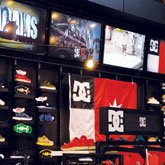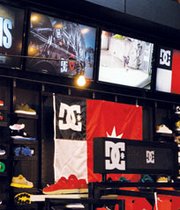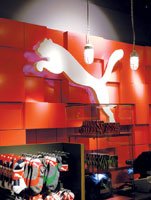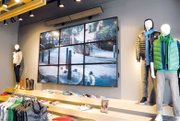Behind the Muzak: Mood Media Makes Retailers’ Soundtracks
Years after the Internet cut much of the music industry’s clout, sales for one music company are rising.
The company is Mood Media Corp., which is headquartered in Toronto and runs a 120-person West Coast office in San Diego. Its mission is to provide music for retail stores.
Mood Media is shaping up to be the leader in its field. It acquired competitor DMX Holdings LLC for $86.1 million in cash in March. Last year, it acquired Muzak Holdings LLC for $345 million. With those acquisitions, the company provides music to 580,000 commercial locations around the world. Mood Media’s sounds are heard daily by 100 million people in fashion stores, restaurants, hotels and supermarkets in the United States and across the globe.
Mood Media and its acquired companies provide music and store messaging for a long list of high-profile retailers, including The TJXCompanies Inc., JCPenney, Macy’s, Quiksilver, Puma, Aeropostale, Levi’s and Jos. A. Bank. But in a tech-savvy world, where creating an in-store sound system should be as easy as connecting a computer to stereo speakers, Mood Media President Mark Elfenbein said major retailers need his service because of one word: licensing. “You cannot play music at a retail location without licensing,” he said.
Under federal copyright law, any business playing music in a public place must pay a fee to the American Society of Composers, Authors and Publishers and Broadcast Music Incorporated (BMI). These organizations compensate publishers and composers for their songs. Enforcement of licensing fees mostly relies on an honor system, but if businesses are sued for not paying music-licensing fees, penalties can be steep—up to $30,000 per infringement, said Ari Surdoval, director of corporation communications at BMI’s office in Nashville, Tenn. More than 650,000 businesses pay small fees, which breaks down to $1 to $2 daily. “It’s an extreme situation that it becomes a legal matter,” he said.
In February, Mood Media debuted its Mbox4 media-player system at the GlobalShop 2012 trade show in Las Vegas. The Mbox4 looks like an Apple laptop computer, and it offers a music system with store playlists delivered over the Internet. A single Mbox4 costs $300, and prices for Mood Media’s programming service vary, depending on how much content is ordered.
Mood’s latest also could help retailers contend with other issues, Elfenbein said. A potential disaster might look like this: A clerk decides to play a favorite hip-hop or rock tune, which features Tupac Shakur or Axl Rose swearing up a blue streak.
“You want to have corporate control with music being played. It is an extension of the brand,” Elfenbein said.
Music also can set the tone of a store, which could attract or repel shoppers. For example, play Chopin at a Hot Topic, and most of the store’s rock music–loving consumers will flee. Light jazz might keep people shopping at a luxury store. Mood Media typically works with retailers to put together a soundtrack appropriate for a store that will fit a brand’s personality.
A brand soundtrack also makes financial sense if it attracts consumers and increases incremental sales, said Lee Sammartino, chief executive for Ikonic Tonic, a branding agency headquartered in Solana Beach, Calif.
“If you look at in-store entertainment at a low-end cost of $45 each month up to $150 each month, and you are a chain with 1,000 stores, your annual costs will be between $540,000 and $1.8 million,” Sammartino said. “When the music is properly aligned with the brand, we feel the result is a positive effect on incremental sales and an increased ROI. In my opinion, that is where Mood excels.”
The market for in-store music and entertainment is competitive, and other companies serving the field include InStore Broadcasting Network, PlayNetwork, PCMusic and XM for Business. “Mood has effectively positioned themselves as the company that delivers a total sensory experience in the physical space and definitely possesses the backbone and the resources to attain global dominance,” Sammartino said. He contended that it is becoming more commonplace for businesses to rely on iTunes or Pandora for in-store music. Stores playing music without a license can be prosecuted for breaking copyright laws that state businesses cannot play music in public places without paying a fee to song publishers.
Setting the “mood”
One of Mood Media’s features for the Mbox4 also offers sound choices for people who work in stores.
By pressing the device’s “mood” button, after store hours, a store manager can change the music, which is picked by company management.
Beyond the music
The Mbox4 also works with third-party applications. One such application is a loyalty application. The Mbox4 media player broadcasts an identification signal that allows third-party applications, such as the loyalty apps, to determine the specific store a person is standing in. The application can then offer that consumer loyalty rewards, such as coupons.
Mood Media intends its Mbox4 to work with its other services, such as visual and digital-signage products. Mood puts together an Mbox4 style service for video images and screens. Quiksilver is using the screen service at its 585 Boardriders shop in Venice, Calif., where more than 17 monitors, including a video wall, show surfing events and lifestyle videos, which are provided by Quiksilver and compiled by Mood Media.
Mood Media also aspires to manage all of the senses for clients. It even puts together scents and fragrances for companies. For example, casinos often want to mask the cigarettes and ash-tray smells with a custom fragrance. Some scents, such as chocolate-chip cookies baking, could attract people to a certain section of a store. With technology becoming more crucial to retailers, Mood Media also is expanding its brand-management efforts to mobile phones and social media. l

























